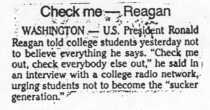"Perhaps the most graphic example of the relationship between human rights and peace is the right of peace groups to exist and to promote their views. In fact, the treatment of peace groups may be a litmus test of governments' true desire for peace."
--President Ronald Reagan,
to the United Nations General Assembly,
September 24, 1984.
 WASHINGTON-U.S. President Ronald Reagan told college students yesterday not to believeeverything he says. "Check me out, check everybody out," he said in an interview witha college radio network, urging students not to become the "sucker generation."
WASHINGTON-U.S. President Ronald Reagan told college students yesterday not to believeeverything he says. "Check me out, check everybody out," he said in an interview witha college radio network, urging students not to become the "sucker generation."
(text of September 11, 1985 The Province article)
"Received from U.S. President Ronald Reagan between January 20, 1981 and January 20, 1989":
...You should 'interpret' this to mean i received nothing from him, despite the facts of the substance of my past work for his predecessor, President Jimmy Carter (work preparedon a bipartisan basis, including representations of both Democrats and Republicans), that i had made a submission to him in 1978 about my work (and affecting his daughter, Patti Davis), and that i had written him in 1981 expressly at the request of METROPOLITAN TORONTO POLICE CHIEF Jack Ackroyd, who had sent a special representative to speak with me directly--to explain he felt beyond his depth in dealing with certain problems lingering since 1977, and who asked me to ask Ronald Reagan for his help. However, i'll quote two things here that may suggest some better understanding of Ronald Reagan's frequently discussed "management style" and his "priorities."
The February 13, 1989 Time magazine "Cover Story" about Bush Administration SECRETARY OF STATE James Addison Baker III titled, 'Playing for the Edge', states this:
"Reagan saved (Baker) from the law in 1980 by offering him a position as 'senior adviser' in his campaign. 'What kind of a title is that?' said Baker at the time. 'It's nothing.' But he took it, and that was all the edge he needed. Into second-rate company, Baker brought a first-rate mind. He quickly became integral to the Reagan operation, and immediately after the election was named White House chief of staff.
Reagan's longtime pal Ed Meese still needed work, so a troika was born. Baker, Meese, and Michael Deaver were each granted equal access to the President. Only gradually did Baker aggregate power to himself. Along the way, though, he gained something less desirable: deep mistrust from right-wing conservatives. They were most enraged by Baker's efforts to increase revenues and cut defense spending to pare the ballooning budget deficit. Reagan didn't much care for Baker's view either. At one point, as the fiscal 1983 budget was being crafted, Baker urged Reagan merely to slow defense spending. In a pivotal confrontation, the President removed his glasses and glowered at his aide. 'If that's what you believe,' said Reagan, 'then what the hell are you doing here?'"
And in his January 11, 1989 "Farewell Address to American People", non-World War Two veteran Ronald Reagan said:
"...We've got to teach history based not on what's in fashion but what's important: Why the pilgrims came here, who Jimmy Doolittle was, and what those 30 seconds over Tokyo meant. You know, four years ago, on the 40th anniversary of D-Day, I read a letter from a young woman writing to her late father, who'd fought on Omaha Beach. Her name was Lisa Zanatta Henn, and she said, we will always remember, we will never forget what the boys of Normandy did. Well, let's help her keep her word.
If we forget what we did, we won't know who we are. I am warning of an eradication of that--of the American memory that could result, ultimately, in an erosion of the American spirit.
Let's start with some basics--more attention to American history and a greater emphasis on civic ritual. And let me offer lesson No. 1 about America: All great change in America begins at the dinner table. So tomorrow night in the kitchen I hope the talking begins. And children, if your parents haven't been teaching you what it means to be an American--let 'em know and nail 'em on it. That would be a very American thing to do..."
If one considers these remarks in relation to term of reference u) to my Christmas, 1987 statement to PRESIDENT OF SOUTH AFRICA Pieter W. Botha--copies of which isent to Ronald Reagan by at least two different means--well, i did get something from him.
...and it wasn't even forty years after the fact.
...and if this is his response, then he obviously wants "Hunger" to continue.
![]() -I WANT TO MAKE IT CLEAR HERE THAT I AGREED WITH THE AILING FORMER U.S. PRESIDENT IN 1985 WHEN HE MADE THE REMARK RE THE "SUCKER GENERATION" THAT I SUBSEQUENTLY DREW TO THE ATTENTION OF TEDDY KENNEDY AS IS SUBSTANTIATED HERE.
-I WANT TO MAKE IT CLEAR HERE THAT I AGREED WITH THE AILING FORMER U.S. PRESIDENT IN 1985 WHEN HE MADE THE REMARK RE THE "SUCKER GENERATION" THAT I SUBSEQUENTLY DREW TO THE ATTENTION OF TEDDY KENNEDY AS IS SUBSTANTIATED HERE.
AND I AGREE WITH HIS PRINCIPLE STILL.
TO SEE WHO ELSE CLEARLY AGREES WITH THIS PHILOSOPHY FOR "OUR COMMON FUTURE" (ON THAT SUBJECT OF WHAT IS AHEAD OF US, CONSIDER THE FIRST FOOTNOTE OF WHAT YOU FIND IF YOU TAKE A BRIEF SIDESTEP HERE), I URGE ONE AND ALL TO TAKE A BRIEF SIDESTEP HERE.